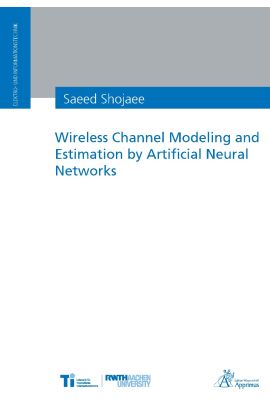This dissertation establishes a novel framework to automate site-specific wireless channel model (CM) generation via Deep neural networks (DNNs). Thereby, the need for complex theoretical analysis and specific parameter estimation is avoided. Furthermore, the implementation of CMs via DNNs facilitates the calculation of the gradient that is used for sensitivity analysis and machine learning purposes. As the initial step, realistic channel modeling is considered. DNNs are used to describe the geometry of the propagation environment and to calculate propagation paths. This work proposes a multi-layered convolutional neural network to extract high and low-resolution geometrical features.
Further contributions cover distribution-free channel modeling by generative adversarial networks (GANs) suitable for Monte-Carlo simulations. The GANs generate samples from the trained multi-dimensional probability distribution. It is shown that GANs outperform other estimation methods when insufficient measurement samples are available. We also provide multiple schemes to obtain statistical knowledge from other environment measurements, known as transfer learning, to reduce the required number of measurement data points. The proposed CMs are studied for different applications. Through emulation and simulation of wireless channels for high-speed trains, a comparison is made between the conventional and the present methods of channel modeling. The results are close to the real world received signal strength and downlink throughput. Likewise, the sophisticated end-to-end design of transceivers is enabled by deep learning-based CM.
Finally, a communication network consist of DNN transceivers is proposed for the next generation of communication. The proposed network can be upgraded instantaneously by updating the DNN transceivers weights. In this network, each base station can train a DNN transceiver with site-specific CMs, to optimize the local communication. A DNN transceiver optimizes the digital transmission chain as a whole and outperforms conventional methods, which optimize each stage independently. The results show that, the proposed CMs train DNN transceivers for practical applications better than existing methods.
| Autor | Shojaee, Saeed |
|---|---|
| Gewicht | 0.22 kg |
| Erscheinungsdatum | 10.06.2021 |
Eigene Bewertung schreiben
Dissertationen
Wireless Channel Modeling and Estimation by Artificial Neural Networks
ISBN: 978-3-86359-969-0
Lieferzeit: 2-3 Tage
39,00 €
inkl. 7% MwSt.
Kurzbeschreibung
This dissertation establishes a novel framework to automate site-specific wireless channel model generation via Deep neural networks. An approach for ray tracing and creation of distribution-free channel modeling by generative adversarial networks is proposed. Moreover, a communication network consist of deep neural network transceivers is presented for the next generation of communication.
Auf Lager

